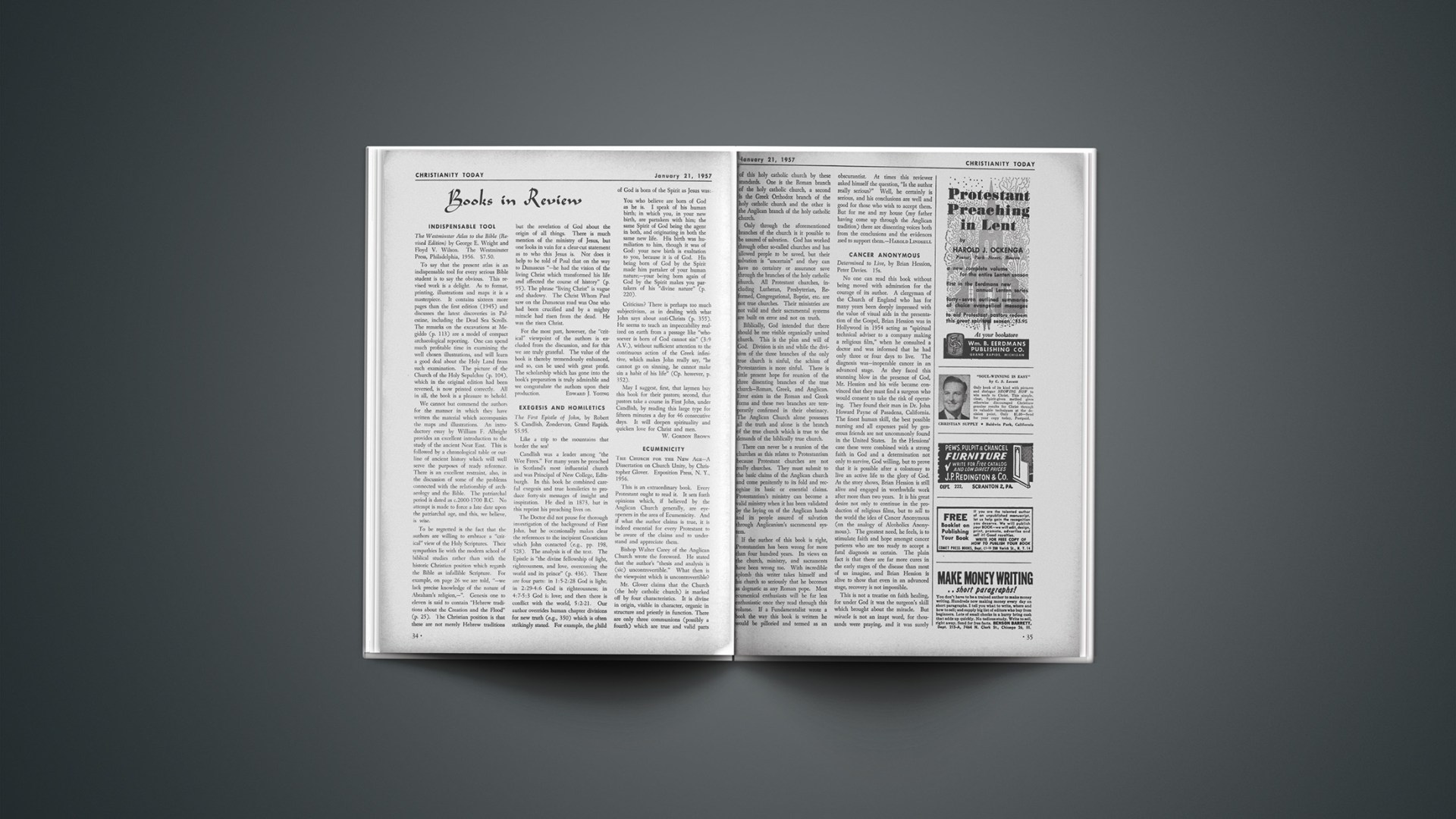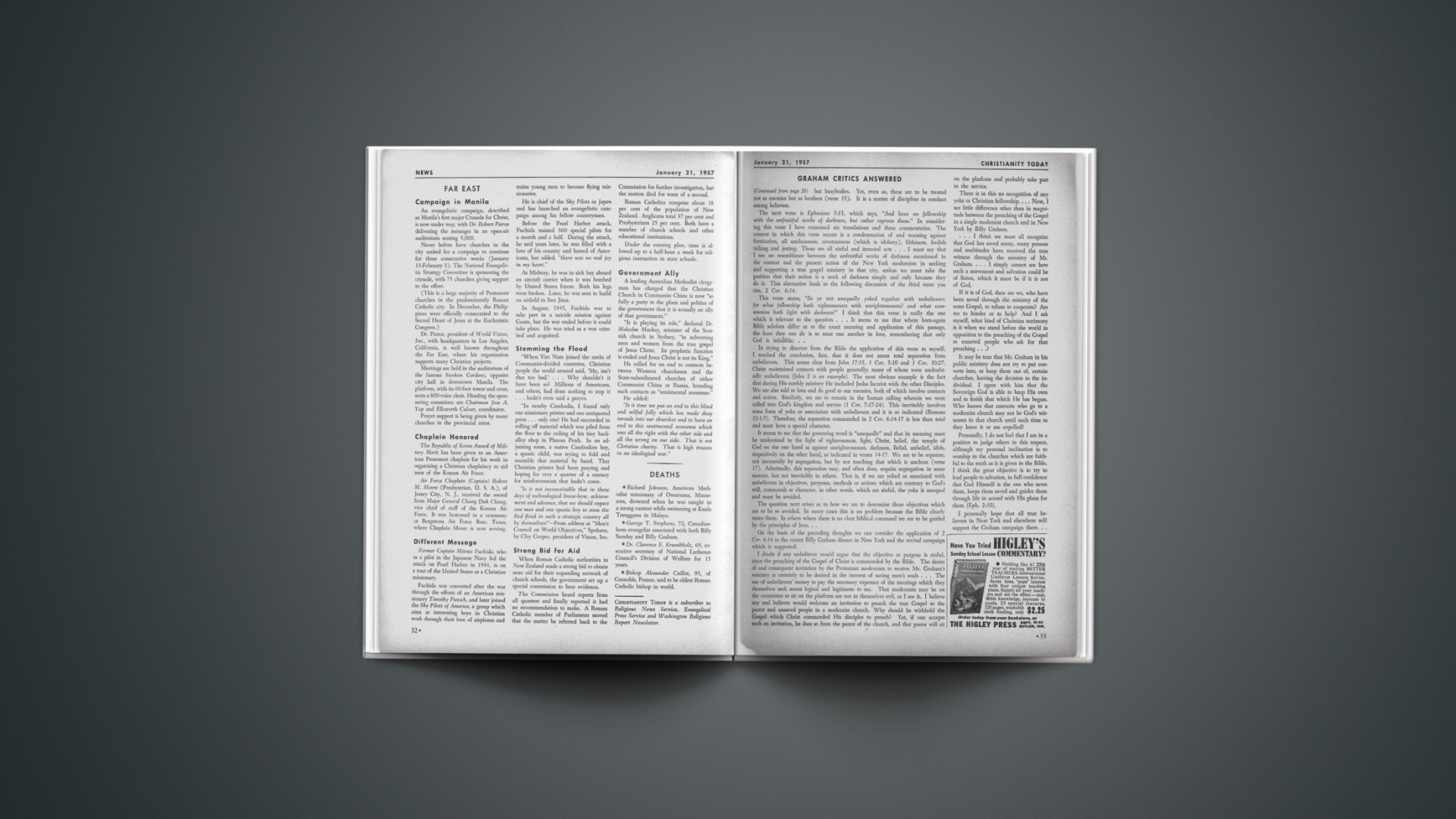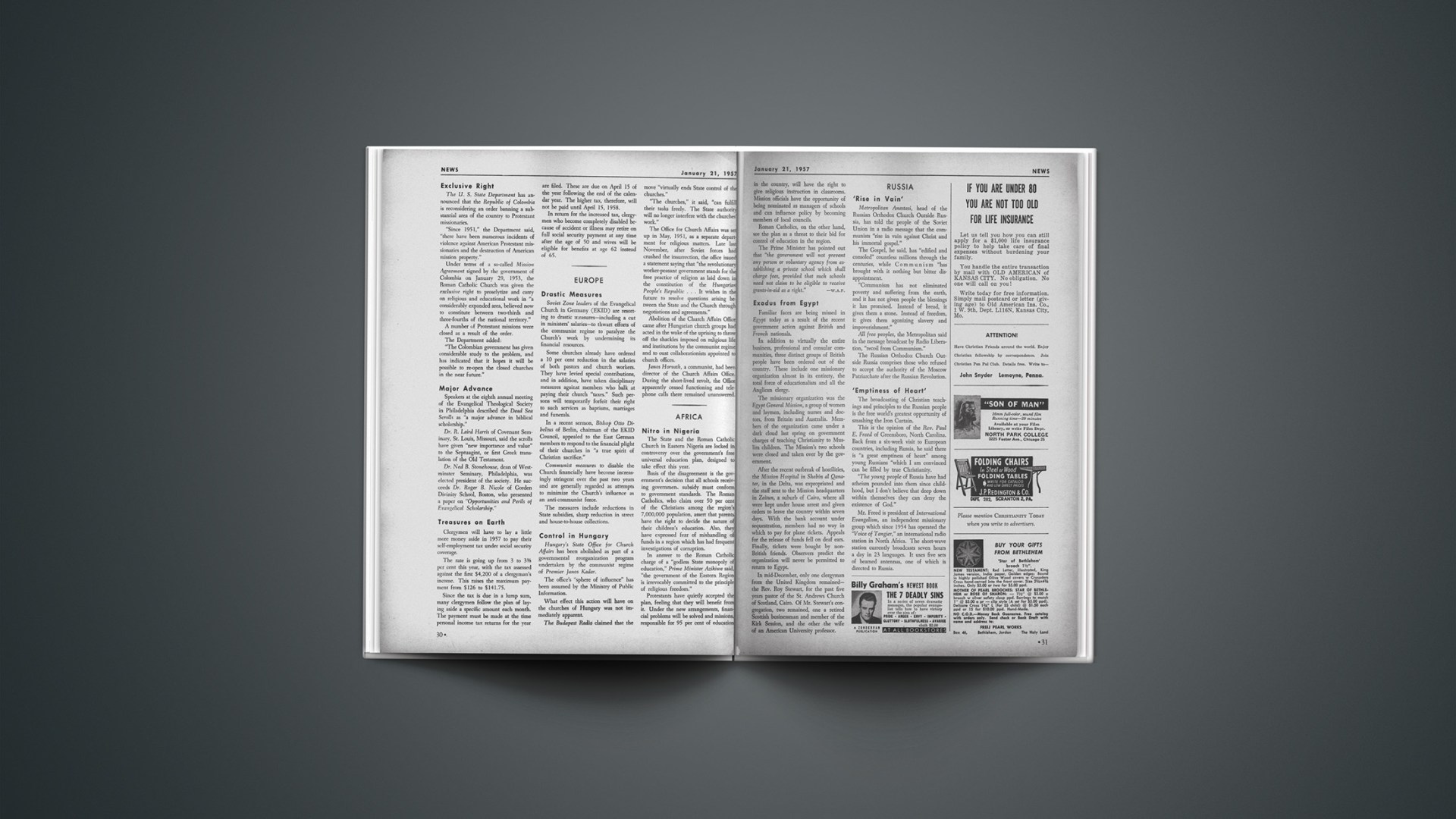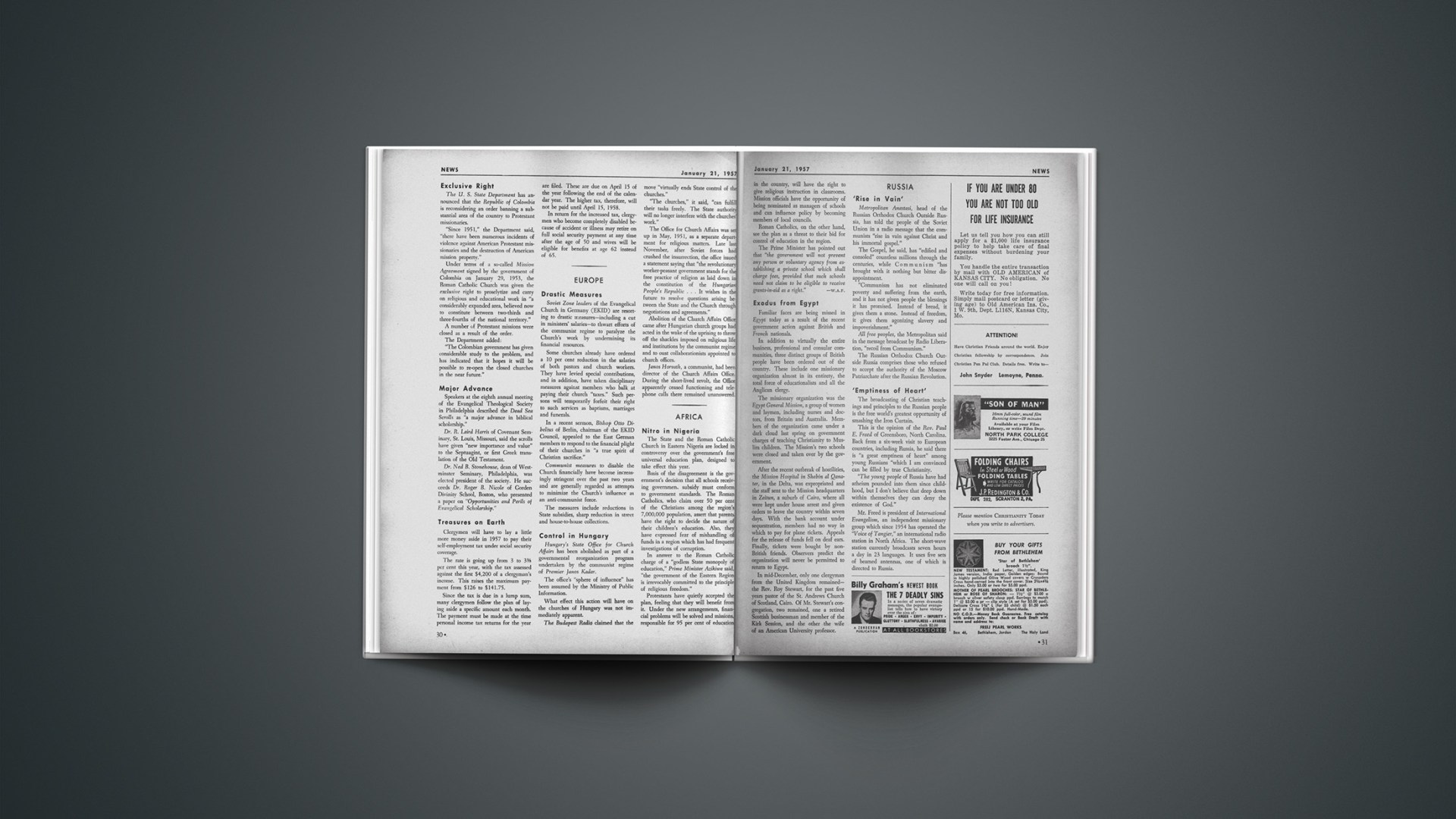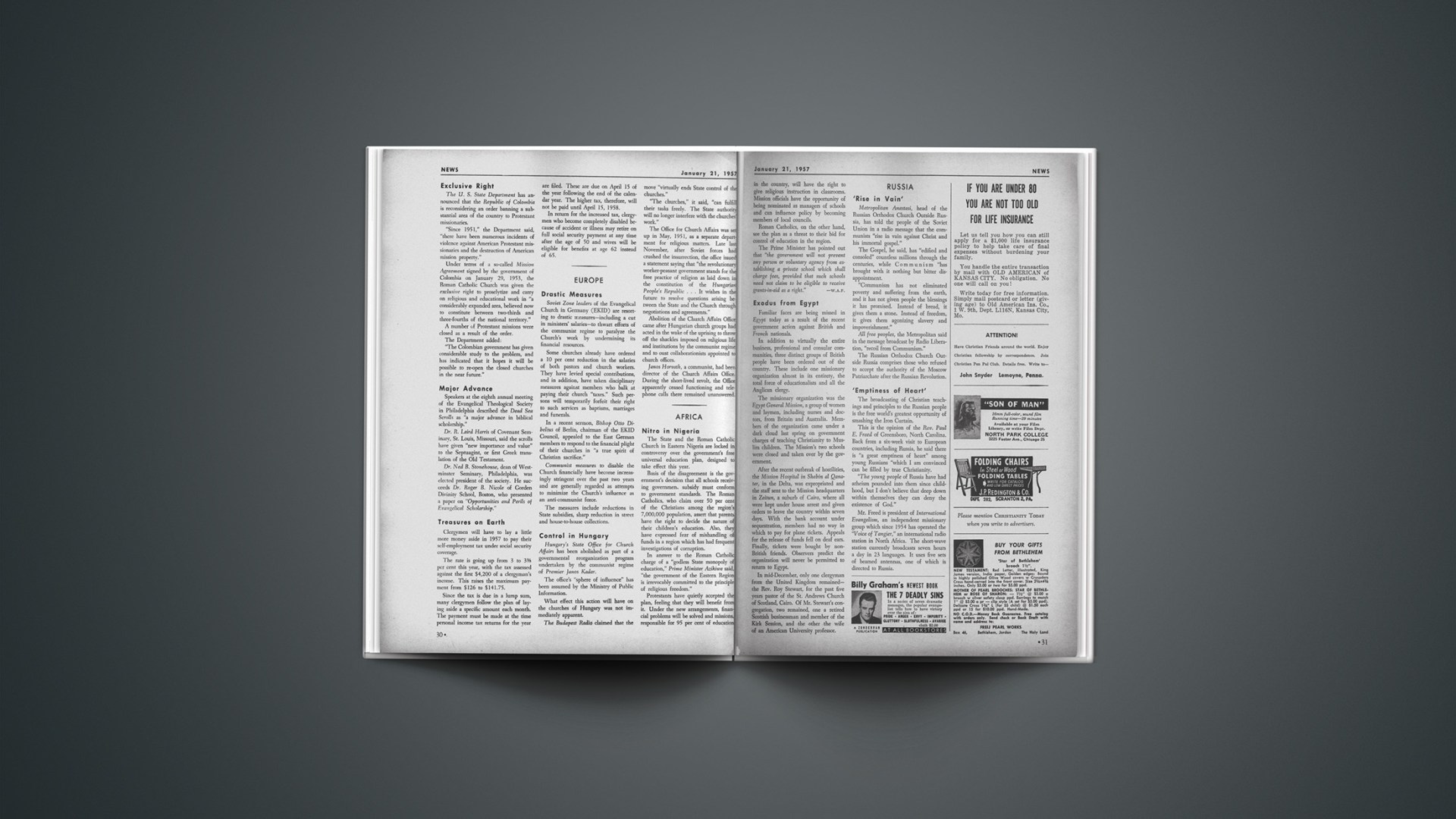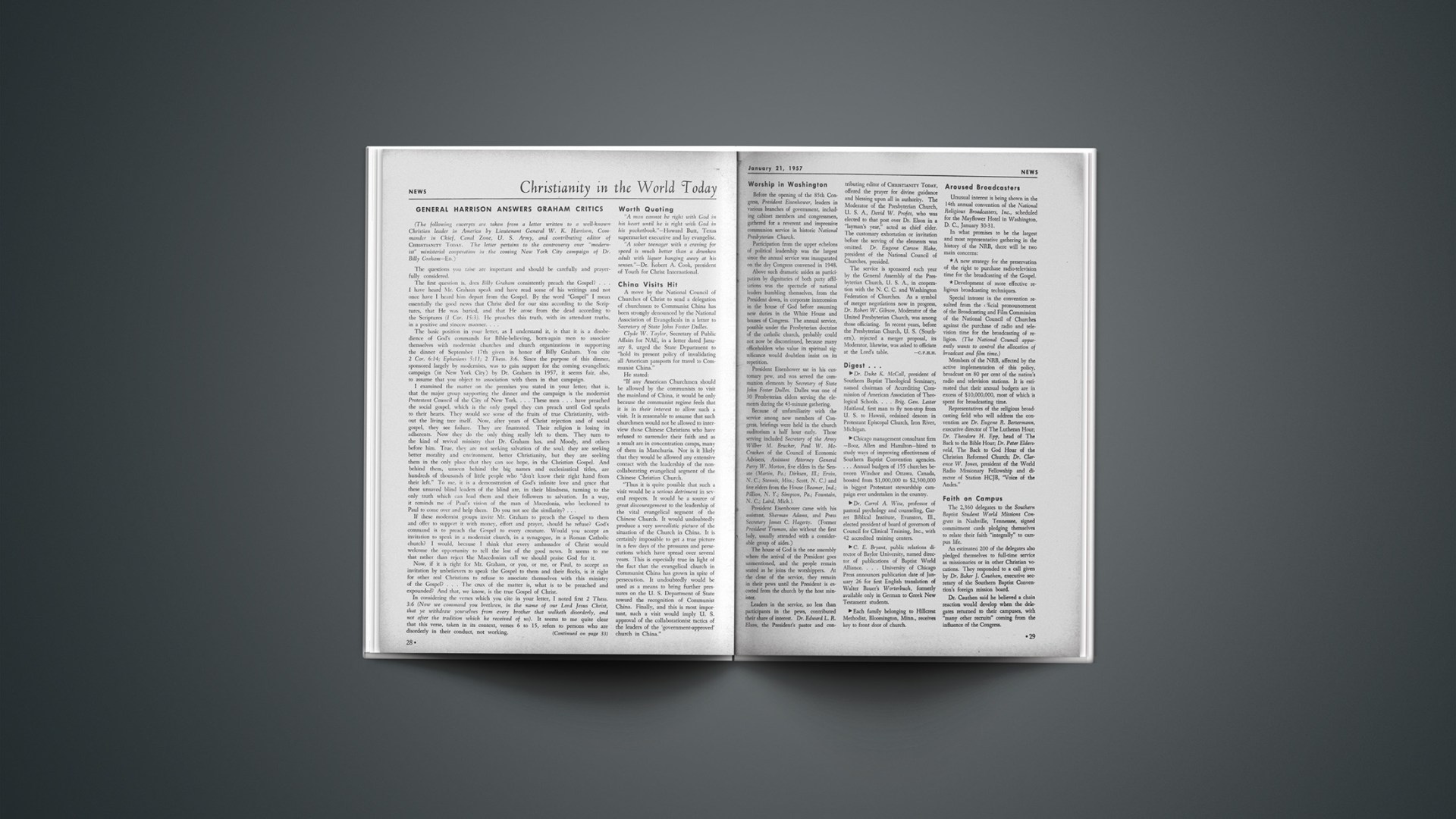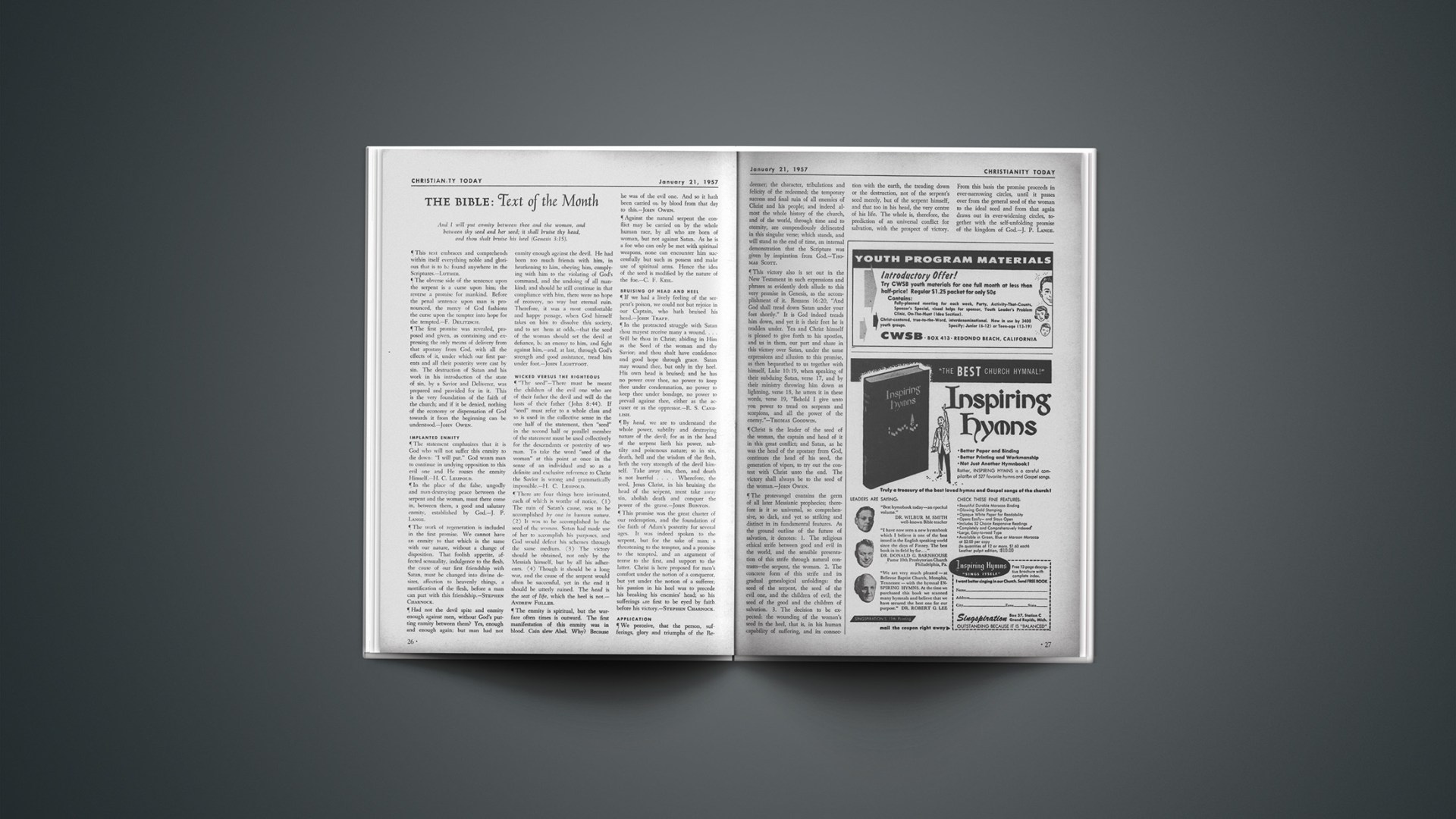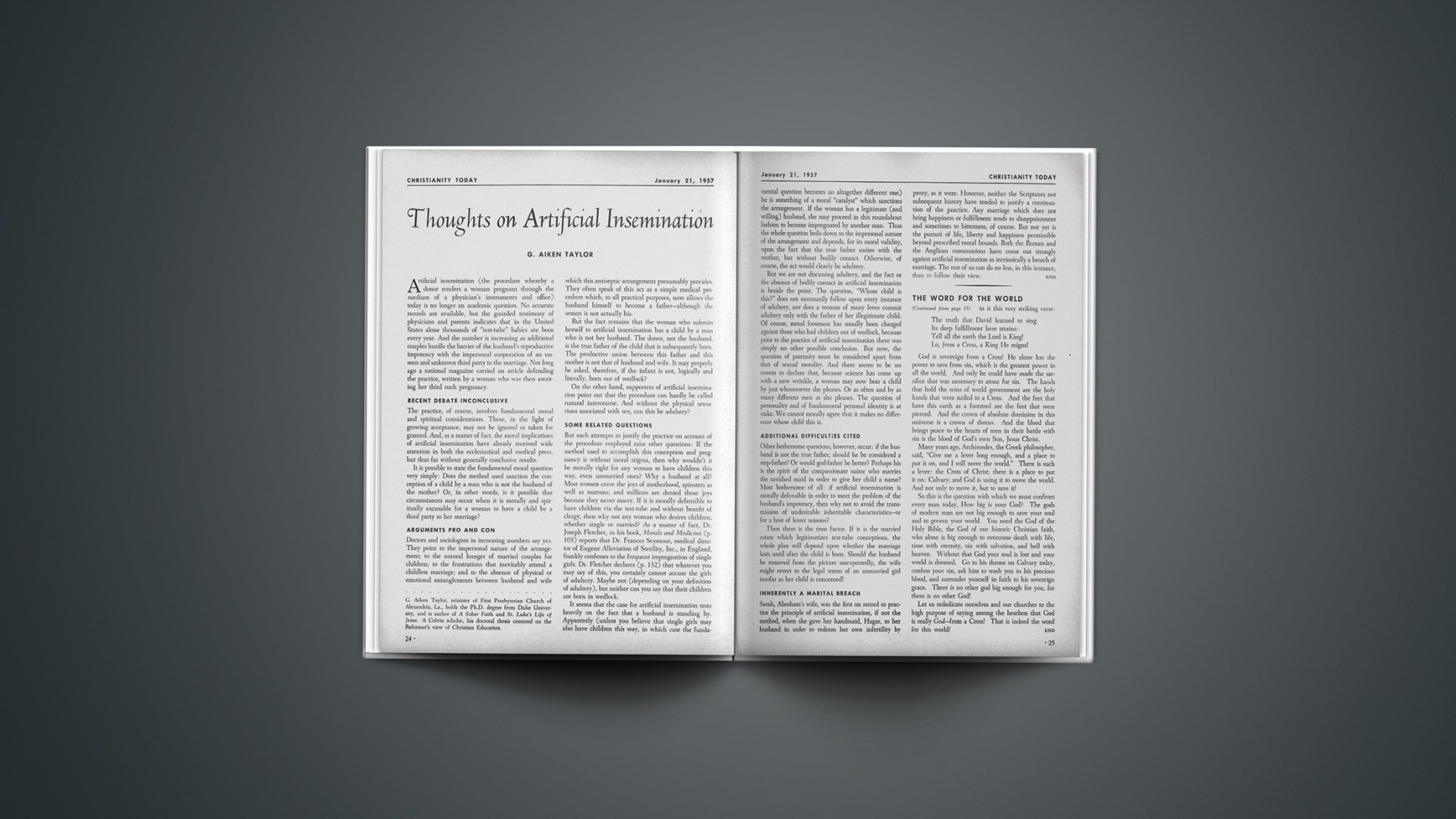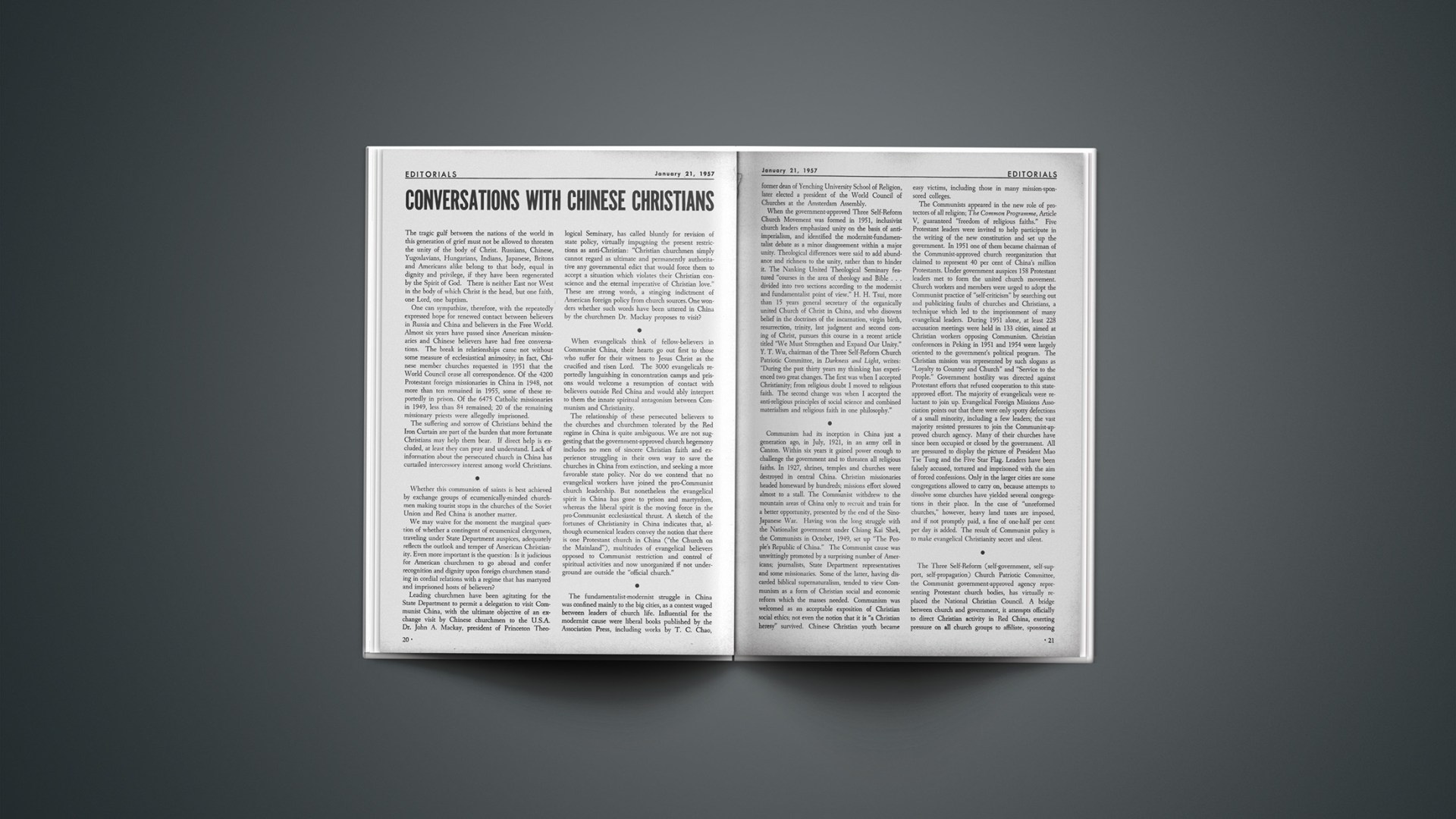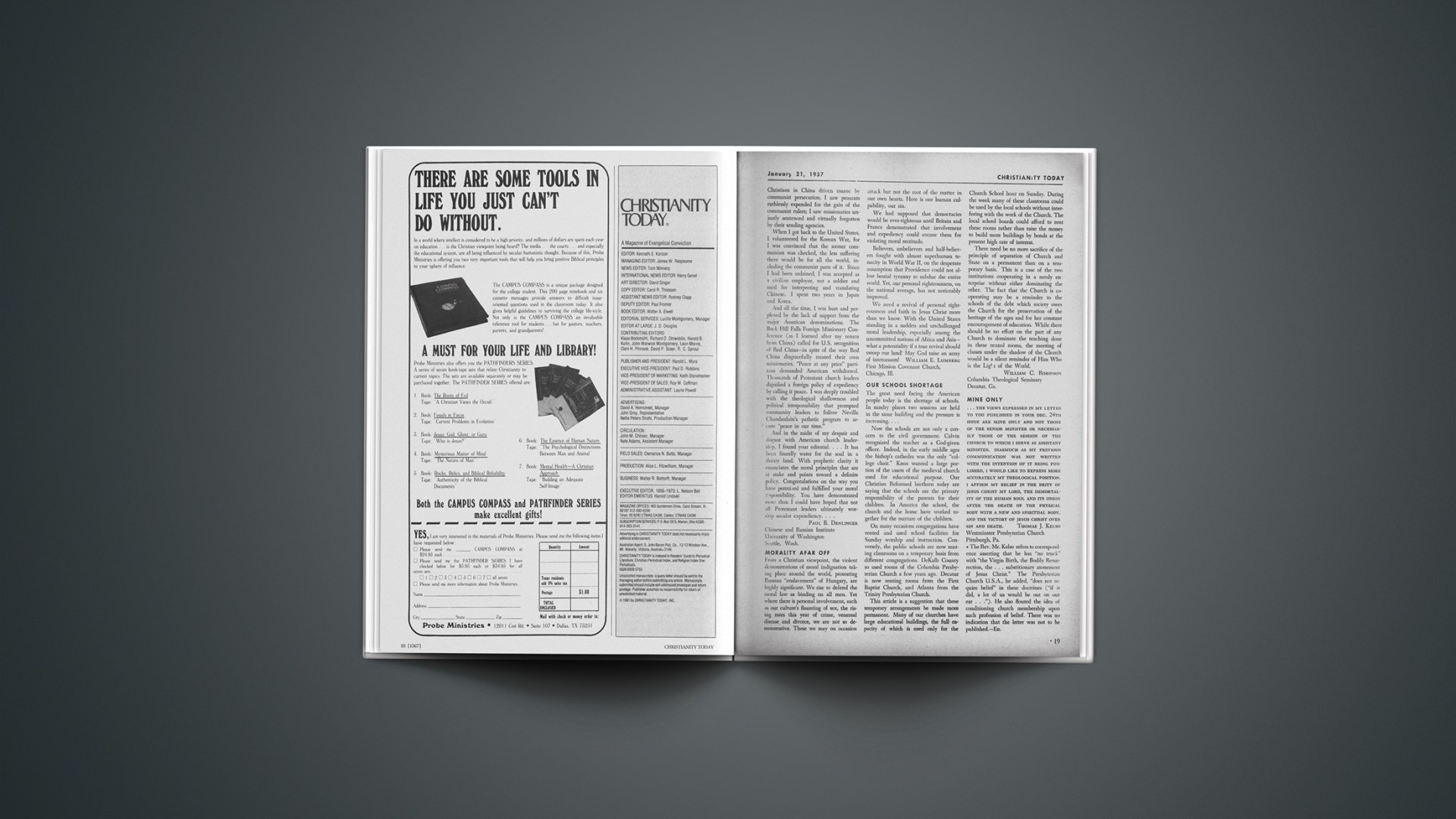Indispensable Tool
The Westminster Atlas to the Bible (Revised Edition) by George E. Wright and Floyd V. Wilson. The Westminster Press, Philadelphia, 1956. $7.50.
To say that the present atlas is an indispensable tool for every serious Bible student is to say the obvious. This revised work is a delight. As to format, printing, illustrations and maps it is a masterpiece. It contains sixteen more pages than the first edition (1945) and discusses the latest discoveries in Palestine, including the Dead Sea Scrolls. The remarks on the excavations at Megiddo (p. 113) are a model of compact archaeological reporting. One can spend much profitable time in examining the well chosen illustrations, and will learn a good deal about the Holy Land from such examination. The picture of the Church of the Holy Sepulchre (p. 104), which in the original edition had been reversed, is now printed correctly. All in all, the book is a pleasure to behold.
We cannot but commend the authors for the manner in which they have written the material which accompanies the maps and illustrations. An introductory essay by William F. Albright provides an excellent introduction to the study of the ancient Near East. This is followed by a chronological table or outline of ancient history which will well serve the purposes of ready reference. There is an excellent restraint, also, in the discussion of some of the problems connected with the relationship of archaeology and the Bible. The patriarchal period is dated as c.2000–1700 B.C. No attempt is made to force a late date upon the patriarchal age, and this, we believe, is wise.
To be regretted is the fact that the authors are willing to embrace a “critical” view of the Holy Scriptures. Their sympathies lie with the modern school of biblical studies rather than with the historic Christian position which regards the Bible as infallible Scripture. For example, on page 26 we are told, “—we lack precise knowledge of the nature of Abraham’s religion,—”. Genesis one to eleven is said to contain “Hebrew traditions about the Creation and the Flood” (p. 25). The Christian position is that these are not merely Hebrew traditions but the revelation of God about the origin of all things. There is much mention of the ministry of Jesus, but one looks in vain for a clear-cut statement as to who this Jesus is. Nor does it help to be told of Paul that on the way to Damascus “—he had the vision of the living Christ which transformed his life and affected the course of history” (p. 95). The phrase “living Christ” is vague and shadowy. The Christ Whom Paul saw on the Damascus road was One who had been crucified and by a mighty miracle had risen from the dead. He was the risen Christ.
For the most part, however, the “critical” viewpoint of the authors is excluded from the discussion, and for this we are truly grateful. The value of the book is thereby tremendously enhanced, and so, can be used with great profit. The scholarship which has gone into the book’s preparation is truly admirable and we congratulate the authors upon their production.
EDWARD J. YOUNG
Exegesis And Homiletics
The First Epistle of John, by Robert S. Candlish, Zondervan, Grand Rapids. $5.95.
Like a trip to the mountains that border the sea!
Candlish was a leader among “the Wee Frees.” For many years he preached in Scotland’s most influential church and was Principal of New College, Edinburgh. In this book he combined careful exegesis and true homiletics to produce forty-six messages of insight and inspiration. He died in 1873, but in this reprint his preaching lives on.
The Doctor did not pause for thorough investigation of the background of First John, but he occasionally makes clear the references to the incipient Gnosticism which John contacted (e.g., pp. 198, 528). The analysis is of the text. The Epistle is “the divine fellowship of light, righteousness, and love, overcoming the world and its prince” (p. 436). There are four parts: in 1:5–2:28 God is light; in 2:29–4:6 God is righteousness; in 4:7–5:3 God is love; and then there is conflict with the world, 5:2–21. Our author overrides human chapter divisions for new truth (e.g., 350) which is often strikingly stated. For example, the child of God is born of the Spirit as Jesus was:
You who believe are born of God as he is. I speak of his human birth; in which you, in your new birth, are partakers with him; the same Spirit of God being the agent in both, and originating in both the same new life. His birth was humiliation to him, though it was of God: your new birth is exaltation to you, because it is of God. His being born of God by the Spirit made him partaker of your human nature;—your being born again of God by the Spirit makes you partakers of his “divine nature” (p. 220).
Criticism? There is perhaps too much subjectivism, as in dealing with what John says about anti-Christs (p. 355). He seems to teach an impeccability realized on earth from a passage like “whosoever is born of God cannot sin” (3:9 A.V.), without sufficient attention to the continuous action of the Greek infinitive, which makes John really say, “he cannot go on sinning, he cannot make sin a habit of his life” (Cp. however, p. 352).
May I suggest, first, that laymen buy this book for their pastors; second, that pastors take a course in First John, under Candlish, by reading this large type for fifteen minutes a day for 46 consecutive days. It will deepen spirituality and quicken love for Christ and men.
W. GORDON BROWN
Ecumenicity
The Church for the New Age—A Dissertation on Church Unity, by Christopher Glover. Exposition Press, N. Y., 1956.
This is an extraordinary book. Every Protestant ought to read it. It sets forth opinions which, if believed by the Anglican Church generally, are eye-openers in the area of Ecumenicity. And if what the author claims is true, it is indeed essential for every Protestant to be aware of the claims and to understand and appreciate them.
Bishop Walter Carey of the Anglican Church wrote the foreword. He stated that the author’s “thesis and analysis is (sic) uncontrovertible.” What then is the viewpoint which is uncontrovertible?
Mr. Glover claims that the Church (the holy catholic church) is marked off by four characteristics. It is divine in origin, visible in character, organic in structure and priestly in function. There are only three communions (possibly a fourth) which are true and valid parts of this holy catholic church by these standards. One is the Roman branch of the holy catholic church, a second is the Greek Orthodox branch of the holy catholic church and the other is the Anglican branch of the holy catholic church.
Only through the aforementioned branches of the church is it possible to be assured of salvation. God has worked through other so-called churches and has allowed people to be saved, but their salvation is “uncertain” and they can have no certainty or assurance save through the branches of the holy catholic church. All Protestant churches, including Lutheran, Presbyterian, Reformed, Congregational, Baptist, etc. are not true churches. Their ministries are not valid and their sacramental systems are built on error and not on truth.
Biblically, God intended that there should be one visible organically united church. This is the plan and will of God. Division is sin and while the division of the three branches of the only true church is sinful, the schism of Protestantism is more sinful. There is little present hope for reunion of the three dissenting branches of the true church—Roman, Greek, and Anglican. Error exists in the Roman and Greek forms and these two branches are temporarily confirmed in their obstinacy. The Anglican Church alone possesses all the truth and alone is the branch of the true church which is true to the demands of the biblically true church.
There can never be a reunion of the churches as this relates to Protestantism because Protestant churches are not really churches. They must submit to the basic claims of the Anglican church and come penitently to its fold and recognize its basic or essential claims. Protestantism’s ministry can become a valid ministry when it has been validated by the laying on of the Anglican hands and its people assured of salvation through Anglicanism’s sacramental system.
If the author of this book is right, Protestantism has been wrong for more than four hundred years. Its views on the church, ministry, and sacraments have been wrong too. With incredible aplomb this writer takes himself and his church so seriously that he becomes as dogmatic as any Roman pope. Most ecumenical enthusiasts will be far less enthusiastic once they read through this volume. If a Fundamentalist wrote a book the way this book is written he would be pilloried and termed as an obscurantist. At times this reviewer asked himself the question, “Is the author really serious?” Well, he certainly is serious, and his conclusions are well and good for those who wish to accept them. But for me and my house (my father having come up through the Anglican tradition) there are dissenting voices both from the conclusions and the evidences used to support them.
—HAROLD LINDSELL
Cancer Anonymous
Determined to Live, by Brian Hession, Peter Davies. 15s.
No one can read this book without being moved with admiration for the courage of its author. A clergyman of the Church of England who has for many years been deeply impressed with the value of visual aids in the presentation of the Gospel, Brian Hession was in Hollywood in 1954 acting as “spiritual technical adviser to a company making a religious film,” when he consulted a doctor and was informed that he had only three or four days to live. The diagnosis was—inoperable cancer in an advanced stage. As they faced this stunning blow in the presence of God, Mr. Hession and his wife became convinced that they must find a surgeon who would consent to take the risk of operating. They found their man in Dr. John Howard Payne of Pasadena, California. The finest human skill, the best possible nursing and all expenses paid by generous friends are not uncommonly found in the United States. In the Hessions’ case these were combined with a strong faith in God and a determination not only to survive, God willing, but to prove that it is possible after a colostomy to live an active life to the glory of God. As the story shows, Brian Hession is still alive and engaged in worthwhile work after more than two years. It is his great desire not only to continue in the production of religious films, but to sell to the world the idea of Cancer Anonymous (on the analogy of Alcoholics Anonymous). The greatest need, he feels, is to stimulate faith and hope amongst cancer patients who are too ready to accept a fatal diagnosis as certain. The plain fact is that there are far more cures in the early stages of the disease than most of us imagine, and Brian Hession is alive to show that even in an advanced stage, recovery is not impossible.
This is not a treatise on faith healing, for under God it was the surgeon’s skill which brought about the miracle. But miracle is not an inapt word, for thousands were praying, and it was surely God who blessed the means used and inspired His servant to remain alive, for the sake of his wife and children and his work, when the medical verdict left no loophole for recovery.
Cancer Anonymous is surely a project which ought to command universal sympathy and widespread support. If the main subject of the book were a plea for the production of religious films, your reviewer would feel obliged to enter one or two strong caveats, particularly concerning the propriety of any actor impersonating our blessed Lord. Nor must affectionate admiration for the author be misconstrued as an endorsement of some decidedly loose phraseology from a biblical and theological standpoint.
FRANK HOUGHTON
Too Brief
A Scholastic Miscellany: Anselm to Ockham, edited by Eugene R. Fair-weather. Westminster, Philadelphia, 1956. $5.00
This book is volume 10 in The Library of Christian Classics. Other volumes are: 1. Early Christian Fathers; 4. Cyril of Jerusalem and Nemesius of Emesa; 15. Luther: Lectures on Romans; 24. English Reformers.
The present volume covers Anselm to Ockham. Aquinas is naturally given a separate volume, but the verb covers is still too inclusive. The material on Anselm is perhaps sufficient, but this can hardly be said of Abelard, Bonaventura, Duns Scotus and Ockham. Duns, for example, is allowed nine pages of fairly important material, and Ockham is give six pages of fairly unimportant material.
The editor’s Introductions to the several sections are well written and reflect great learning; but they are so general and summary that I fear a scholar would find them too brief and a general reader too unintelligible.
GORDON H. CLARK
Missionary Literatur
Jungle Doctor Hunts Big Game, by Paul White. Paternoster Press. 4s.6d.
Here we have the fourteenth volume the now famous Jungle Doctor series, but lest there should be any misgiving, prospective readers may be assured that there is absolutely no sign of any diminution in Dr. White’s unrivalled powers as a narrator of his missionary experiences and adventures in Central Tanganyika. From beginning to end the book is completely absorbing, and in places most moving. Like its predecessors, its pages effectively and unselfconsciously display the Gospel as the power of God unto salvation to every one that believeth, and as missionary literature, entirely suitable for both young and old and challenging to both young and old and challenging to both believer and unbeliever, we know of nothing better. The book is attractively illustrated by Graham Wade.
PHILIP E. HUGHES
Biography
The Protestant Bishop, by Edward Carpenter. Longmans. 35s.
This is the biography of a Bishop of London who, though little known, exercised a powerful influence upon the destinies of the English Church and people. Henry Compton came of a noble family which had rendered great service to the Royalist cause. Henry Compton exiled himself to the continent during the commonwealth and only returned to England with the restorction of the monarchy.
His early promotion is sensational by our standards and stemmed, no doubt, from his noble birth, but was later justified by his outstanding ability. He was ordained deacon and priest in 1666; three years later he became a Canon of Christ Church, Oxford. Within a month he proceeded to the degrees of B.D. and D.D. In 1674 he was made Bishop of Oxford and a year later, of London.
Compton was a man of very simple faith. His biographer says, “he may perhaps be numbered among the twice born.” He scorned the proud conceit of those who exalted their own intellect above spiritual understanding. “We are absolutely dependent,” he writes, “upon the righteousness of Christ for our justification: and for getting out of our state of corruption into the glorious liberty of the children of God.”
He was devoted to the monarchy because he was even more passionately devoted to the English way of life, and he believed each to be dependent upon the other. But he was a typical Englishman in his rooted antipathy to the Church of Rome which he considered to be alien to the freedom-loving Englishman, the inevitable cause of despotism and tyranny and the source of unscriptural doctrine and worship. Thus his career as a Bishop was dominated by a determination to keep England Protestant, and this determination ultimately overrode even his loyalty to his sovereign. It was impossible to avoid a clash between Bishop and King. Whatever religious sympathies Charles had were with Rome, and his successor, James, was a Roman Catholic determined to force his religion upon the Country. Compton drafted a loyal address on behalf of the clergy in which he assured the King that “our religion established by law is dearer to us than our lives.” Compton was soon suspended from office but he did not cease to use his influence to oppose the policy of the King. The danger to Parliamentary Government from the King’s arbitrary conduct and the threat to the Church from his Roman Catholic influence, drove Compton to be one of the signatories to the invitation to William of Orange to come to England. Canon Carpenter’s book has much that is relevant to our contemporary situation. Compton taught his clergy by an ingenious system of conferences the dangers of Roman Catholicism and the errors of that church, and he saw that this teaching was passed on to the people. Such teaching would be most valuble in this age of what Bishop Hensley Henson called “comfortable anarchy.”
When the bloodless revolution was achieved many of Compton’s Episcopal friends deserted him and the Archbishop shut himself up at Lambeth and took no part in the Coronation. (Incidentally it was left to Compton to draft a Coronation service which is substantially what we use today and it was his genius which introduced the presentation of the Bible to the sovereign). Episcopal leadership is frequently timid and hesitating in matters of deep theological moment but in things of social or political sentimentality they are bravely, but not always wisely, vocal.
Compton’s boldness and faithfulness was not rewarded by William or Anne, both of whom passed him over when the Archbishopric was vacant. This soured him so that in his later years he encouraged “just those elements in the nation which would have bypassed the Act of Succession in the interests of the Pretender.” It is refreshing to read of an ecclesiastic in high office so fearless and forthright in his determination to preserve the church and nation from spiritual tyranny, but it is rather saddening to discover that human nature in every age bears some of the less attractive characteristics.
Parts II and III of this book tell the story of Compton’s work as a Diocesan Bishop and his responsibility as such for chaplains in “the Plantations of America.” His wide sympathies included the French Refugees and the Greek Orthodox Community in London. It is interesting to note that his conditions for approving of a Greek Orthodox Church in London were that there should be no pictures or ikons, they must repudiate the doctrine of transubstantiation, and there must be no prayers to the Saints.
T. G. MOHAN
Cultic Dictatorship
Thirty Years A Watch Tower Slave—The Confessions of a Converted Jehovah’s Witness, by W. J. Schnell. Baker Book House, Grand Rapids, $2.95.
This volume was writen by a man who was entangled in the cult of Jehovah’s Witnesses for three decades. He writes his personal life testimony of his relationship to this movement. The story is in the form of an expose of the cult and its machinations.
Briefly the author contends that the cult is dangerous, having its origins in the personalities of Charles Taze Russell and Judge Rutherford. Both of these men, he claims, were deceivers who deliberately and for evil gain created this cult and its crude theology. Based upon distortions and falsehoods the cult moved forward in a totalitarian framework in which innocent men and women were led astray. The victims lost their freedom, their right to think and their souls too in the maze of this deception. Once under the iron rule and reign of the cultic dictatorship the victims were used to promote the sale of literature and to fill the coffers of the cult with the financial gains.
When an individual tried to free himself from the meshes of the dictatorship he would be persecuted and hounded in a fearful fashion. Mr. Schnell himself experienced the tortures perpetrated on those who would be free—not in the sense of physical imprisonment but from the pressures used by the organization to keep the victims in line.
One cannot doubt the genuineness of the author’s insights nor the obvious lessons which should be learned from his experiences. At the same time one cannot but be amazed at the organizational zeal of the movement and its remarkable success in winning converts. Quite obviously the cult is not even sub-Christian—just anti-Christian and thoroughly dangerous.
The volume lacks some of the artistic graces of good writing, but it has the touch of the sincere about it.
HAROLD LINDSELL

